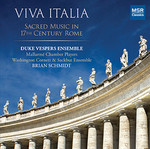|
Back
07/15/2016
“Viva Italia: Sacred Music in 17th century Rome”
Anonymous: Plainchant (Psalm 70:2)
Marc-Antoine Charpentier: Dixit Dominus
Thomás Luis de Victoria: Ave Regina Caelorum (A8) – Salve Regina (A5) – Regina Caeli (A8)
Giacomo Carissimi (arr. Lyle Nordstrom): O Dulcissimum Mariae Nomen
Giovanni Felice Sances (arr. Stephen Saunders and David Hauser): Missa Sancta Maria Magdalenae – Ave Maris Stella – Vulnerasti cor Meum
Giovanni Pierluigi da Palestrina: Alma Redemptoris Mater
Julianna Emanski (Soprano), Laura Dawalt (Soprano), Douglas Dodson (Countertenor), Elizabeth Knight (Mezzo-soprano), Bille Bruley (Tenor), Nathan Hodgson (Tenor), Matthew Curran (Bass), Christopher Jacobson (Organist), Washington Cornett and Sackbut Ensemble, Mallarmé Chamber Players, Brian Schmidt (Choral conductor)
Recording: Duke University Chapel (April 18, 2015) – 58’ 28
MSR Classics #MS 1580 – Booklet in English

   
Along with the turn of the 17th century in Italy came exciting times: here we find a collectivization capturing essences of sanctified music channeled through Roman Catholic priests’ contrapuntal values, those works centering around the Collegio Germanico which helped transmogrify religious pieces tendered from late Renaissance to early Baroque periods. The Duke Vespers Ensemble, a conglomerate of two esteemed musical enterprises, portend these religious polyphonies and antiphons into a brilliant, convincing argument, personifying the realizations and admirations of a public eager for these musical epistles. The melding of voice and instrument garners well-conceived diction.
Under command of Brian Schmidt, this MSR Classics recording has control and understated substance. There’s a broad feeling of heavenly discretion, politely metered via two musical factions featuring the expertise of the Mallarmé Chamber Players and the Washington Cornett Sackbut Ensemble. Peace and tranquility is elegantly pervasive with genuine appeal and comfort. The latter musical amalgam has an interesting discourse by acting as a roving promotional entity in order to highlight the importance of brass instruments predating today’s burnished collection. This adds commanding pronouncement to works penned by composers of the time.
Even though Claudio Monteverdi acts as the well-defined bridge between these two musical exercises, the selection of works by his contemporaries, Charpentier, de Victoria, Carissimi, Palestrina and Sances, are a befitting addition. Particularly, Palestrina’s portfolio, prolific in output, isn’t mired down by tedium or overuse: his creations are timeless and could never be categorized as hum-drum. Palestrina’s polyphonic display could be described as ‘the quintessential spiritual food’, nourishment for mortal mankind, bringing relevancy to the forefront without ever mentioning the word passé. In light of the recent Nice tragedies, Palestrina’s music brings meaning and comfort in today’s world by extolling innocence platonique. The human soul contemplates the meaning of heaven and the hereafter inside The Ensemble’s splendidly balanced and thoughtful Alma redemptoris mater. By far, this is one of the loveliest pieces to grace the CD.
Most importantly is the World Premiere Recording of Sances’ composition, Missa Sancta Maria Magdalenae, with its myriad of treasures: the piece (particularly in the “Gloria”) exercises vocal restraint while the “Credo” teems with a well-blending of parts. The cornetto instrumental section, majestic in delineation without unbearable weight, houses an important dimension to the impenetrable fort of religious quality.
Impressive and passive, Viva Italia is a timely release in this most uncertain world. Western Civilizations will find this CD an oasis of conservation, contemplation, and amiable consideration. Sound quality is excellent. Recommended.
Christie Grimstad
|